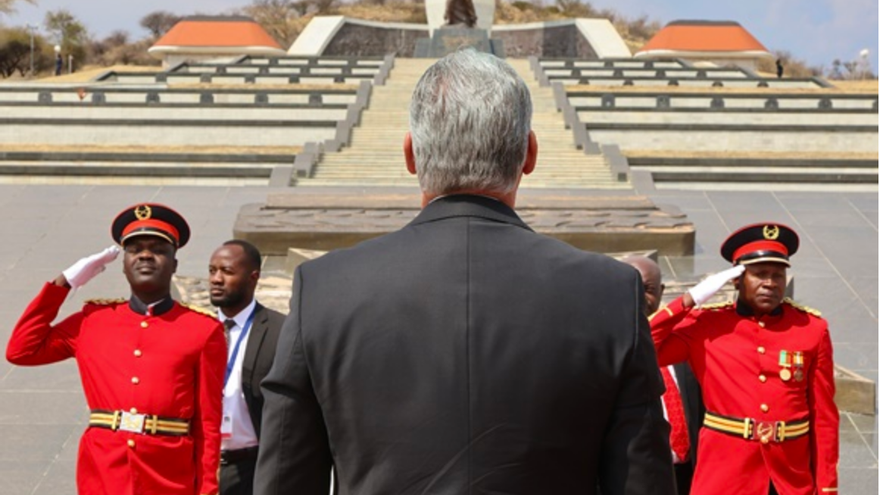
![]() 14ymedio, Havana, 29 August 2023 — Miguel Díaz-Canel closes his visit to Namibia “with a flourish,” headlines the official Cuban press on Tuesday about the tour that the president has just made through several African countries. Cubadebate limits commentary to the symbolic aspect of the trip without mentioning a word about “the great hopes around Namibia’s oil and natural gas potential.”
14ymedio, Havana, 29 August 2023 — Miguel Díaz-Canel closes his visit to Namibia “with a flourish,” headlines the official Cuban press on Tuesday about the tour that the president has just made through several African countries. Cubadebate limits commentary to the symbolic aspect of the trip without mentioning a word about “the great hopes around Namibia’s oil and natural gas potential.”
This quote comes from an exchange between 14ymedio and Professor Jorge Piñón, an academic and specialist in the oil sector at the University of Texas. He believes that Havana has its eyes on the African country, which could soon become another Venezuela.
It was Díaz-Canel’s first visit as head of state to Windhoek, although exchanges between Cuba and Namibia have been constant since the Island contributed to the war in which it gained its independence from South Africa. Travel from one side of the Atlantic to the other has been common for Cuba’s leaders, including former presidents Fidel and Raúl Castro, and cooperation between the two nations has been extensive in health, education, agriculture, sports and, especially, fishing.
Namibia doesn’t plan to achieve oil production until 2029, but the infrastructure is already developing
The coast of Namibia, stretching almost 994 miles, has attracted the attention of several major multinationals. “Shell, Total, GALP, Qatar, Chevron and Exxon have invested heavily in exploration activities in the region and have already discovered reserves of at least 11 billion barrels of light oil and up to 13 billion cubic feet of natural gas in the Orange basin,” the professor adds.
The results are yet to come, since Namibia is not expected to achieve its first oil production until 2029, but the infrastructure is already developing and may represent a stellar opportunity for the country. According to data from its state hydrocarbon company, Namcor, the nation could be one of the top 15 oil exporters by 2035, and the gross domestic product (GDP) per capita could double in less than a decade.
In April 2021, Namibia and Venezuela held the first meeting about the oil field based on a cooperation agreement signed in 2020. Since then, Caracas has advised the African country in the exploitation of the enormous mass of wealth found in the depths off its coast, while contributing experience in mining.
“Cuba and Namibia have a long and deep political relationship of more than forty years as demonstrated by the recent State visit to Windhoek, the capital of Namibia, by Cuba’s president, Miguel Díaz-Canel,” Piñón says.
Havana has sent doctors on international missions to the country since 1990, a total of 1,194, according to a note from the Ministry of Public Health this Sunday. Currently in the country there is a group of 80 health workers who provide services in eleven of the fourteen Namibian regions and whom Díaz-Canel met during his visit.
According to Piñón, it is possible that Havana will decide to “increase the current number of medical aid workers in Namibia in exchange for oil, increasing a crucial supply for the Cuban economy,” a common practice of the regime, which uses its health personnel as currency, as it also does with its teachers, soldiers and engineers.
Before his passage through Namibia, Díaz-Canel was in Angola, one of the main oil powers of Sub-Saharan Africa
Before his passage through Namibia, Díaz-Canel was in Angola, one of the main oil powers of Sub-Saharan Africa (second on the continent and sixteenth worldwide).
The Cuban president stopped in Mozambique, on the border with South Africa, after attending the BRICS summit. “in his capacity as pro tempore president of the G-77 plus China.” Mozambique, for the moment, is one of the largest exporters of natural gas, especially to Europe, occupying the gap left by Russia after the invasion of Ukraine. But in recent years the world’s major oil companies have also set their sights on Mozambique and are trying to exploit some promising deposits found in the Rovuma basin.
Díaz-Canel already dedicated last winter to trying to solve his fuel problems in Algeria, Turkey, Russia and China, in addition to other economic issues. Now, he has once again spent another winter – the southern one – in the search for a new Venezuela in other latitudes. Upon his return, a tropical storm was waiting for him that was already beginning to leave entire municipalities of the Island without power.
Translated by Regina Anavy
____________
COLLABORATE WITH OUR WORK: The 14ymedio team is committed to practicing serious journalism that reflects Cuba’s reality in all its depth. Thank you for joining us on this long journey. We invite you to continue supporting us by becoming a member of 14ymedio now. Together we can continue transforming journalism in Cuba.
